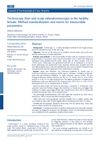 March 2024 in “Journal of functional foods”
March 2024 in “Journal of functional foods” Collagen peptides from marine and bovine sources may help prevent hair loss by affecting hair follicle stem cells differently.
May 2022 in “Dermatology practical & conceptual” Trichoscopy is crucial for diagnosing and managing androgenetic alopecia, showing increased vellus hairs, empty follicles, and fibrosis with severity.
 April 2022 in “Medicina estética”
April 2022 in “Medicina estética” Minoxidil is the only FDA-approved treatment for female hair loss, with other potential treatments needing more research for effectiveness.
 September 2024 in “Indian Journal of Dermatology”
September 2024 in “Indian Journal of Dermatology” Trichoscopy effectively diagnoses and assesses the severity of androgenetic alopecia.
 9 citations,
September 2012 in “Clinical Endocrinology”
9 citations,
September 2012 in “Clinical Endocrinology” More than half of patients who had acromegaly surgery experienced hair loss, with varying degrees of recovery.

Oral minoxidil effectively treats hair loss, with women needing lower doses (0.25 to 2.5 mg daily) and men needing higher doses (1.25 to 5 mg daily).
 1 citations,
January 2021 in “Acta dermatovenerologica Alpina, Pannonica et Adriatica (Tiskana izd.)”
1 citations,
January 2021 in “Acta dermatovenerologica Alpina, Pannonica et Adriatica (Tiskana izd.)” High prolactin levels might be linked to hair loss in autoimmune thyroid disease, but more research is needed.
 June 2011 in “The Journal for Nurse Practitioners”
June 2011 in “The Journal for Nurse Practitioners” Up to half of adult women may experience hair loss, and doctors should use medical history, exams, and tests to find the cause and treat it.
 6 citations,
April 2010 in “Journal of Dermatological Science”
6 citations,
April 2010 in “Journal of Dermatological Science” Laminin-511 may help promote hair growth, while laminin-332 does not affect hair loss.
3 citations,
January 2021 in “Medicinski arhiv” Trichoscopy, a hair loss evaluation technique, found that people with Androgenetic Alopecia have more thin hairs, yellow dots, and perifollicular discoloration than healthy individuals.
 March 2024 in “Journal of clinical medicine”
March 2024 in “Journal of clinical medicine” Trichoscopy shows hair diameter variability, vellus hairs, and the peripilar sign are key indicators for diagnosing Androgenetic Alopecia.

Mesotherapy is a promising alternative to minoxidil for hair loss with mild side effects.
 196 citations,
June 2008 in “International Journal of Dermatology”
196 citations,
June 2008 in “International Journal of Dermatology” Dermoscopy helps diagnose and manage alopecia areata by showing specific hair changes.
 August 2024 in “Quality in Sport”
August 2024 in “Quality in Sport” New treatments for common hair loss are needed.
 June 2023 in “International journal of pharmaceutical quality assurance”
June 2023 in “International journal of pharmaceutical quality assurance” Videodermoscopy is effective for diagnosing different types of non-scarring hair loss.
 January 2015 in “Hair therapy & transplantation”
January 2015 in “Hair therapy & transplantation” New hair and scalp disease diagnosis methods are important for correct treatment.
 2 citations,
August 2023 in “Marine drugs”
2 citations,
August 2023 in “Marine drugs” Collagen from tilapia scales may improve hair and skin health by reducing stress and inflammation and encouraging hair growth.
 46 citations,
April 2009 in “Journal of Dermatological Case Reports”
46 citations,
April 2009 in “Journal of Dermatological Case Reports” Researchers established normal hair and scalp characteristics for healthy women using trichoscopy.
 February 2024 in “Heliyon”
February 2024 in “Heliyon” People with androgenetic alopecia have different lipid levels in their blood, which vary between men and women, and may be linked to a higher risk of metabolic syndrome.
 18 citations,
May 2015 in “Australasian Journal of Dermatology”
18 citations,
May 2015 in “Australasian Journal of Dermatology” Serenoa repens extract in topical products improves hair growth and appearance in male pattern baldness with mild side-effects.

Drinking sweetened tea and late bedtimes increase the risk of hair loss in women.

Drinking sweetened tea and poor sleep habits increase the risk of hair loss in women.

Drinking sweetened tea and poor sleep increase the risk of hair loss in women.

Drinking sweetened tea and soda and poor sleep may increase the risk of hair loss in women.
 5 citations,
May 2018 in “Statistics in Medicine”
5 citations,
May 2018 in “Statistics in Medicine” Model improves accuracy in predicting hair loss effects.
 33 citations,
July 2020 in “Journal of The American Academy of Dermatology”
33 citations,
July 2020 in “Journal of The American Academy of Dermatology” PRP treatment improves hair density and thickness for alopecia, but needs more research.

Drinking sweetened tea and poor sleep habits may increase the risk of hair loss in women.

Drinking sweetened tea and late bedtimes increase the risk of hair loss in women.
 2 citations,
January 2023 in “International Journal of Biological Sciences”
2 citations,
January 2023 in “International Journal of Biological Sciences” A specific pathway involving AR, miR-221, and IGF-1 plays a key role in causing common hair loss.

Sleep may mediate the link between sugary drinks and female hair loss.



























